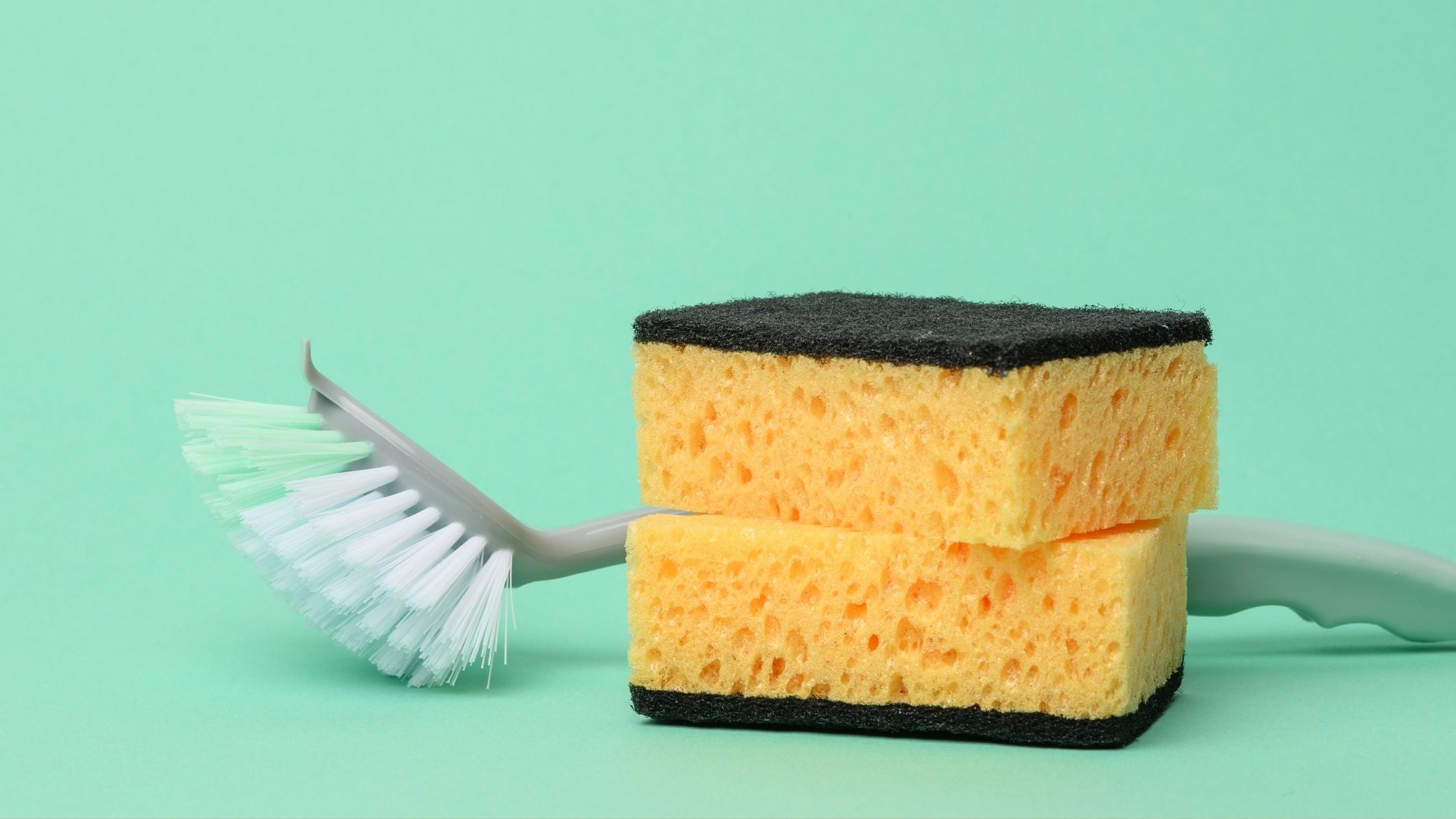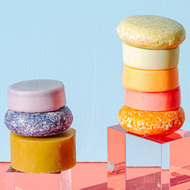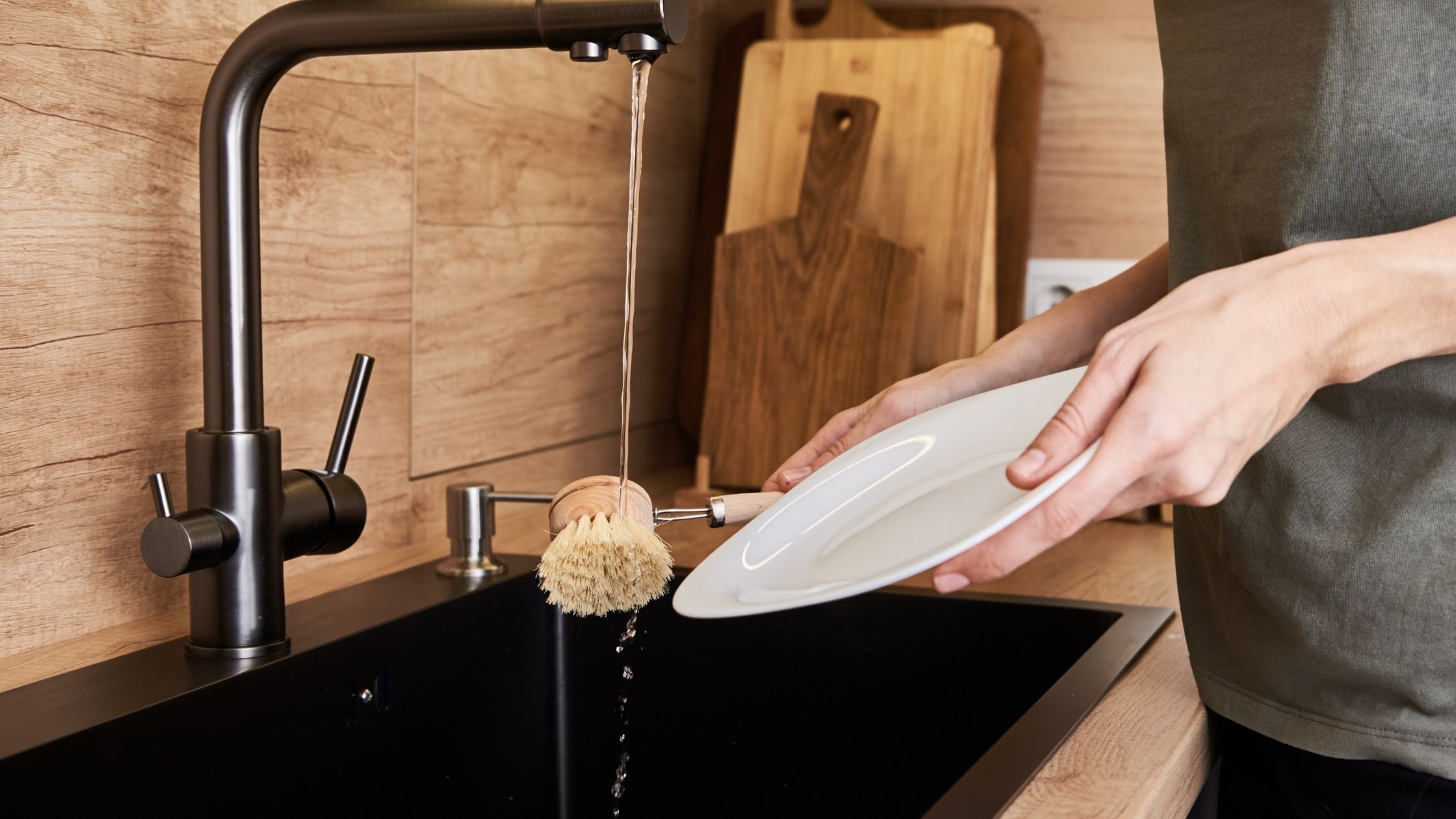Scrub Brushes vs. Single-Use Plastic Sponges

Is your routine feeling less-than-eco-friendly? Are you tired of tossing away smelly, damp, and non-recyclable sponges? Or are you simply looking for ways to make eco-friendly purchases and build better routines?
If you answered yes to any of these questions, it’s time to shake things up with a kitchen scrub brush! Ditch your old, dirty sponges and get on board with something better for you and better for the planet, too.
What is a Scrub Brush?
A dish scrubber is exactly what it sounds like – a brush with hard bristles that make it easy to clean different things. With the growth of the eco-friendly movement, many people have been looking for ways to improve their cleaning routines.
This brush is a great way to do that. It’s another way to ditch damaging disposable items in often dirty areas of our homes that need a lot of attention. Sponges don’t last very long, which contributes to their wastefulness. These scrub brushes make cleaning easier and more sustainable.
How are Scrub Brushes Different from a Sponges?

There are some obvious differences between plastic sponges and scrub brushes, and some not-so-obvious differences, too. Visually, anyone can tell the difference between the two. Sponges are porous and rectangular, often orange or green, and absorbent.
Dish scrub brushes, on the other hand, are bristly and the handles come in a wide range of colors. The bristles are usually white, which makes it easier to tell when you’re cleaning effectively.
Some are pointed or curved, while others have long handles. Different scrub brushes may look different, but they serve the same purpose. They are coarser, longer, and easier to use, making them a versatile household product.
Why Are Bamboo Products Better than Plastic Sponges and Brushes?
Although generally, all cleaning brushes are better than sponges, some brushes are better than others. Some are made from plastic, which isn’t a whole lot better than using a plastic-based sponge. Others are made of silicone.
But two of the best brush materials are wood and bamboo. Typically, one of the most eco-friendly materials we can use inside and outside of our homes is bamboo. That’s right, bamboo. Bamboo is one of the most sustainable materials out there.
It is the world’s fastest naturally renewing resource. Beyond that, bamboo is also naturally anti-bacterial, anti-fungal, and anti-microbial. And who wouldn’t want those benefits in a product that they’re rubbing on different objects in their home?
What Happens to Used Sponges?

The CDC recommends changing your sponge every two weeks. Some experts even recommend swapping it out once per week rather than every two. Regardless of the material it’s made from, something that gets tossed after a week or two can’t be very sustainable.
But that’s not the only problem with traditional sponges. Traditional plastic sponges don’t decompose. They’re not recyclable. And as we know now, plastic that ends up in a landfill or ocean can live on for up to 500 years.
There is a substance in certain plastic products called polyethylene terephthalate that makes these products nearly indestructible. So, while bacteria can easily and happily eat away at discarded food materials, paper products, and wood, they can’t do the same thing with plastics.
Instead, plastics refuse to degrade naturally and take a long time to decompose in the sun. There isn’t much that we can do about all the plastics in our landfills now. We can only wait it out and let the sun work its magic over time. But we can ensure that we aren’t adding more plastics to the heap and making the problem worse.
How Long Do Scrub Brushes Last?
Depending on where and how you use them, how often you clean them, and how well it’s made, a scrub brush can last up to four months. If it starts to look worn out or excessively dirty sooner, you can always replace it before the four months is up.
But even the most worn-out scrub brush has likely lasted longer than the sponge it replaced. If most sponges need to be replaced within two weeks and most brushes need to be replaced within four months, the choice is clear.
Eco-friendly dish scrubbers last significantly longer than disposable sponges. This makes them ideal for kitchen cleaning, where things can and often do get messy regularly. And they’re not just for scrubbing dishes, either.
Although, they are pretty great at that. Have you ever had to squish a small, absorbent sponge around inside a tall wine glass or a baby bottle? Most of the time, we can’t reach down to the bottom, we get our hands stuck, or we leave spots unwashed.
A long handle scrub brush solves that problem. Whether you’re scrubbing regular dishes, pots and pans, or the inside of awkward bottles and glasses, you’ll have the reach you need. No more struggling to get everything clean without spending the whole day scrubbing.
Other Uses in the Kitchen
Brushes are great for scrubbing stubborn stains and food particles off your dishes, pots, and pans. They make bottle and glass cleaning effortless. And it doesn’t end there. There are many uses for scrubbers in the kitchen.
The long handle also gives you better leverage when it’s time to scrub the kitchen counters, cabinets, sink, or stove. You can also use your brush to get everything clean inside of the microwave or oven.
With some hot water and a little zero-waste dish soap, you can clean almost anything in your kitchen. A zero waste dish soap is way better than plastic liquid detergent. Scrub brushes are better for the environment, longer-lasting, more hygienic, and easier to use. Instead of pushing dirt around or soaking it up, brushes lift and remove it. Check out more about zero-waste cleaning products such as our laundry detergent sheets in this article.
It’s time for guilt-free, effective kitchen cleaning.
Sustainable Cleaning with a Kitchen Scrub Brush
When it comes to replacing wasteful plastic sponges with eco-friendly alternatives, you’ve got a few different options. We have three favorites scrub brushes, including our:
You can also buy a convenient wooden dish brush replacement head instead of replacing the whole brush when the time comes. For whatever you’re getting ready to scrub, we’ve got the perfect eco-friendly option for you.
Wooden Dish Brush
Our wooden dish brush is ideal for all kinds of kitchen cleaning, especially cleaning dishes, pots, and sinks. The long handle gives you leverage and makes it easy to get into all kinds of difficult cleaning spots.
Plus, you can save the handle and just replace the head to make the base last as long as possible. No more cycling through cleaning products every week or two. We make it easy to build more sustainable cleaning routines.
It ships plastic and package-free and the bristles are made from plant fibers for a zero-waste experience from start to finish. The handle is made of sustainable German beechwood and bristles are sisal, a Mexican plant with large, fleshy leaves.
The sisal is what gives the brush its long-lasting and highly effective cleaning abilities. Sisal is a thick, hard fiber that is wear-resistant and very easy to clean. To ensure that the brush lasts as long as possible, avoid leaving it soaking in water.
Each time you finish using it, rinse the bristles with clean water and hang the brush to air dry. Once it’s worn out, you can compost the wooden head and bristles. And you can recycle the metal staples in a metal recycling bin.
Dish Scrubber
Our dish scrubber gives you another opportunity to scrub your plates, pots, pans, glasses, and more without the use of plastics. Rather than the long reach you get with the wooden sink brush, the dish scrubber is shorter, wider, and gives you a more concentrated clean.
It has a natural beechwood handle, and the bristles are made of union fibers, which also come from a sturdy Mexican plant. These fibers are stiff enough to clean effectively but flexible enough to contour to different cleaning spots.
This combination gives you a heavy-duty clean without making you work too hard for it, which makes it good for scrubbing out stains on a variety of surfaces. It is also safe to use in boiling water, making it ideal for stubborn stains and difficult cleaning needs.
Our dish scrubber is your zero-waste alternative to wasteful plastic scrub brushes. Once you wear it out, both the wood handle and plant fiber bristles can be composted or buried in your yard. Like the wooden dish brush, it shouldn’t be soaked.
Rinse and hang to air dry when you’re done for the best results. With no plastic involved in any step of the process, you can feel good about bringing this brush into your home. We recommend picking up one of each product to effectively cover all of your cleaning needs.
Natural Loofah
This one is a bit different from the two brushes but it’s no less important and has just as many uses. Our natural loofah looks and functions the most like a sponge, which makes it an easy way to transition into more sustainable cleaning methods.
Say goodbye to plastic sponges forever with this plant-fiber loofah sponge. Scrub and clean your dishes, counters, sink, and other areas of your home. Loofah is a fiber from the cucumber family. It makes for a very sustainable and effective cleaning product.
Our natural loofah is made from 100% compostable fibers. Once you wear it out, simply bury it in the garden or throw it on your compost pile. The loofah will decompose within 30 days. And because it ships package-free, the loofah is the only thing you’ll have to dispose of.
Where Else Can You Use One?
A scrub brush with a handle is a versatile weapon in the constant battle against dirt, oil, bacteria, and other unwanted particles in our homes. We have already mentioned some of the most common kitchen uses. Now, let’s talk about how to use them in other rooms.
You can use our scrub brushes to clean your bathrooms, living room, windows, and other surfaces in need of a good, deep clean. The natural loofah can even be used for mild body exfoliation after you shave or to massage your skin and improve circulation as you bathe.
It works great to improve dry skin and buff away rough spots. In the kitchen, your natural loofah should be replaced every four to six weeks, depending on how often you use it and how well you allow it to dry out.
In the shower and bathroom, it may last a week or two less. But this depends on how often you use it, what products you use it with, and how well you clean it after you’re done. Use your best judgment and replace the product when you feel that it cannot be cleaned or is no longer effective.
Each of our three options can be used in the kitchen, bathroom, and elsewhere in the house. Use them to clean your showers and tubs, sinks, counters, and other surfaces as needed. You can even use them to clean dirty hardwood or tile floors and kitchen backsplashes.
To avoid cross-contamination, we recommend picking up a few different brushes and natural loofahs and leaving them in the areas of the house where you’ll use them. You can also reduce the spread of germs and bacteria by thoroughly cleaning your brushes and loofahs after using them.
Eco-Friendly Kitchens and Homes with EcoRoots
So, why should you switch to scrub brushes and natural loofahs? The easier question to answer would be, why shouldn’t you switch? Because there isn’t a single reason that we can think of that you shouldn’t make the switch.
But there are at least a dozen reasons why you should. Among them, our brushes and natural loofahs are better for the planet, better for you, last longer, and offer more effective cleaning where and when you need it most.
Eco-friendly products aren’t just the future anymore. They’re the here and now. Shop our zero waste store home and kitchen collection today to get started.


















Leave a comment